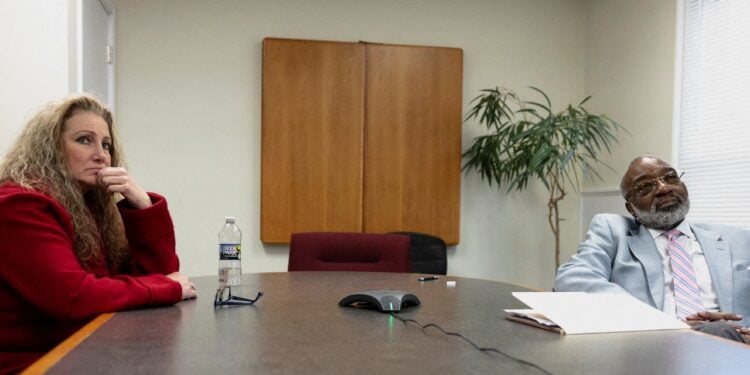U.S. Supreme Court justices appeared on Wednesday to lean toward making it easier for people from “majority backgrounds,” such as white or straight people, to pursue workplace discrimination claims, as they heard an appeal by an Ohio woman who claims she was denied a promotion and demoted because she is heterosexual.
The justices heard arguments in a case in which the plaintiff, Marlean Ames, is asking them to revive her civil rights lawsuit against her employer, Ohio’s Department of Youth Services, after lower courts ruled against her. The justices seemed poised to throw out a ruling against Ames by the Cincinnati, Ohio-based 6th U.S. Circuit Court of Appeals and direct lower courts to reconsider the matter.
Ames v. Ohio Case Details
Ames, 60, has argued that she was discriminated against because she is heterosexual in violation of a landmark federal anti-discrimination law. Ames said she had a gay supervisor in 2019 when she was passed over for a promotion in favor of a gay woman and demoted in favor of a gay man — both of whom, she asserted, were less qualified than her.
A ruling in favor of Ames could bolster the growing number of lawsuits by white and straight workers claiming illegal bias — often called “reverse discrimination” — amid a backlash by conservatives and Republicans against initiatives promoting diversity, equity and inclusion in the workforce. On his first day back in office last month, Republican President Donald Trump ordered the dismantling of such policies in federal agencies and encouraged private companies to follow suit.
At issue in the Ames case is the requirement by some U.S. courts that plaintiffs from majority groups provide more evidence than minority plaintiffs to show they faced discrimination under Title VII of the Civil Rights Act of 1964. This law prohibits discrimination based on race, religion, national origin and sex — including sexual orientation.
These courts have said the higher bar is justified because discrimination against those workers is relatively uncommon.
The 6th Circuit concluded in 2023 that Ames had not shown the required “background circumstances” indicating that a defendant accused of workplace bias is “that unusual employer who discriminates against the majority.”
Xiao Wang, the lawyer arguing for Ames, told the justices that the Supreme Court has said in prior rulings that “Title VII aims to eradicate all discrimination in the workplace.”
“But the background circumstances rule doesn’t do that, doesn’t eradicate discrimination,” Wang said. “It instructs courts to practice it by sorting individuals into majority and minority groups based on their race, their sex or their protected characteristic” and applying an evidentiary presumption against plaintiffs “based solely on their being in a majority group, however you define it.”
“But that’s not consistent with the statute that tells us that we’re supposed to protect all individuals from individual discrimination based on the individual case,” Wang added.
Conservative Justice Amy Coney Barrett asked Wang to address the concern expressed by Ohio that ruling in favor of Ames would “throw the door wide open to Title VII suits, because now everybody can say, ‘Hey, this was discrimination on the basis of race, gender, et cetera.'”
“The Wrong Way”
Ashley Robertson, arguing for the U.S. Justice Department, told the justices that a ruling in favor of Ohio would risk screening out discrimination cases that have merit. The burden on plaintiffs is already high, Robertson said, and the 6th Circuit in this case added an additional requirement that many plaintiffs cannot meet.
Robertson said the U.S. Equal Employment Opportunity Commission dropped the heightened standard nearly two decades ago, and added that there are other mechanisms for the EEOC and courts to screen out frivolous cases.
“We share Ohio’s concerns about making sure that meritless cases don’t reach trial,” Robertson added. “We just think that raising the standard at step one would be the wrong way to address that problem.”
Liberal Justice Ketanji Brown Jackson suggested that the position being argued by Elliot Gaiser, the lawyer for the Ohio Department of Youth Services, would impose too heavy a burden on plaintiffs at the initial stage of their legal proceeding.
Gaiser told the justices that Ohio “agrees it is wrong to hold some litigants to a higher standard because of their protected characteristics” but said that is not what happened in this case. Gaiser said Ames failed to establish that anybody was motivated by sexual orientation in making the employment decisions “or even knew her sexual orientation — nor the orientation” of the two gay employees.
The NAACP Legal Defense & Educational Fund and other civil rights groups said in a legal filing that Ames is asking the justices “to interpret Title VII in a way that ignores the realities of this country’s persisting legacy of discrimination in evaluating disparate-treatment claims.”
They said the “background circumstances” inquiry lets courts account for the reality of historical and present-day discrimination “against certain minority groups like Black and/or LGBTQ people, and the virtual absence of widespread discrimination targeting certain majority groups like white people and straight people.”
Ames started working in the Department of Youth Services, which oversees Ohio’s juvenile corrections system, in 2004, and was promoted in 2014 to administrator of the department’s program aimed at complying with federal standards for preventing sexual abuse in its facilities.
In 2019, Ames interviewed for a newly created “bureau chief” position, but was not offered the job. It was filled by a gay woman who had not applied for the post. Department leaders said Ames lacked the vision and leadership skills needed for the new position, according to court filings.
Around the same time, Ames learned she was being demoted to her previous secretarial role, resulting in an annual pay cut from about $100,000 to $60,000. A gay man was selected to take her place.
Ames sued in federal court in 2020 seeking monetary damages.
(Reporting by John Kruzel in Washington and Andrew Chung in New York; Editing by Will Dunha


















